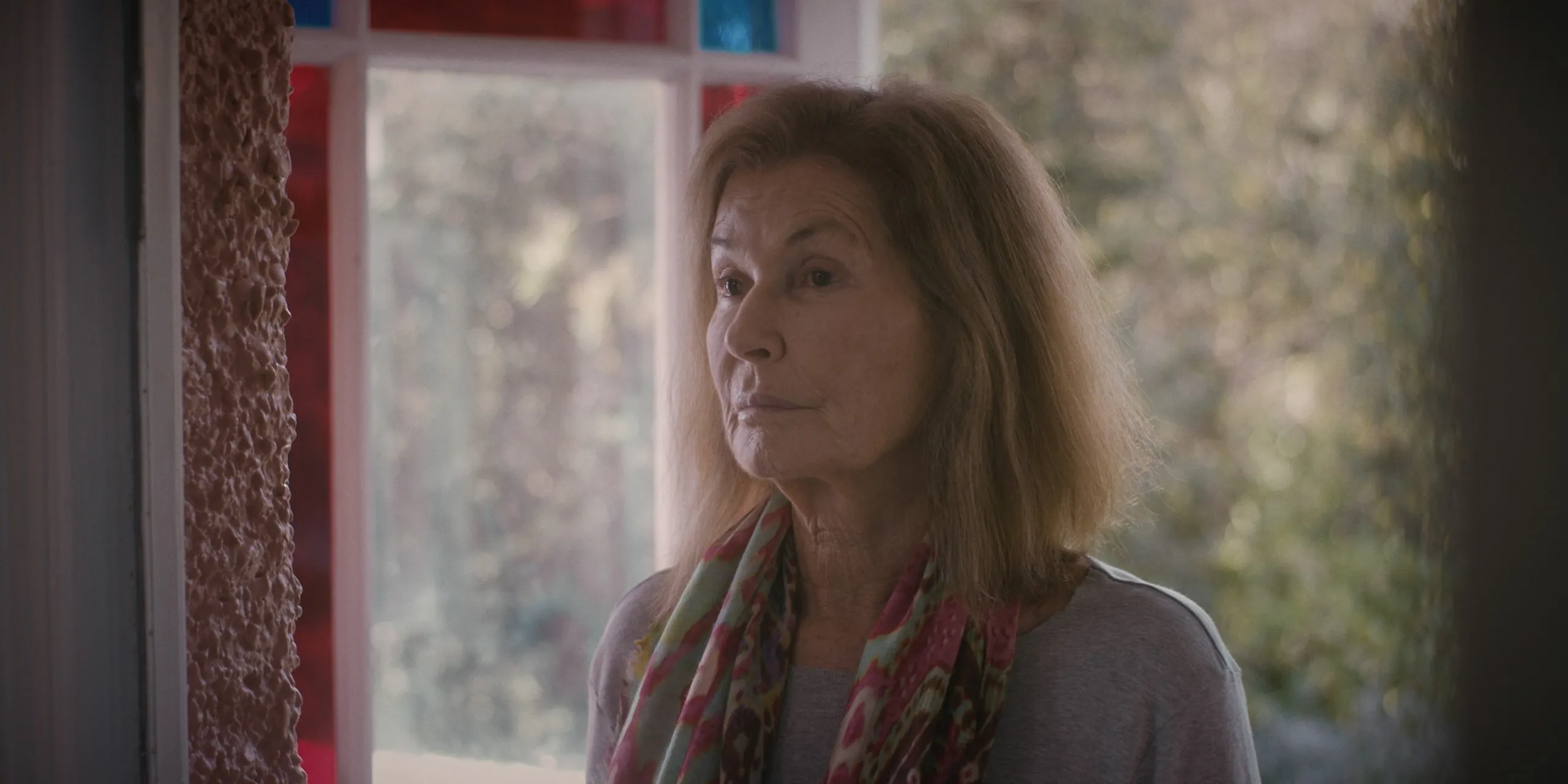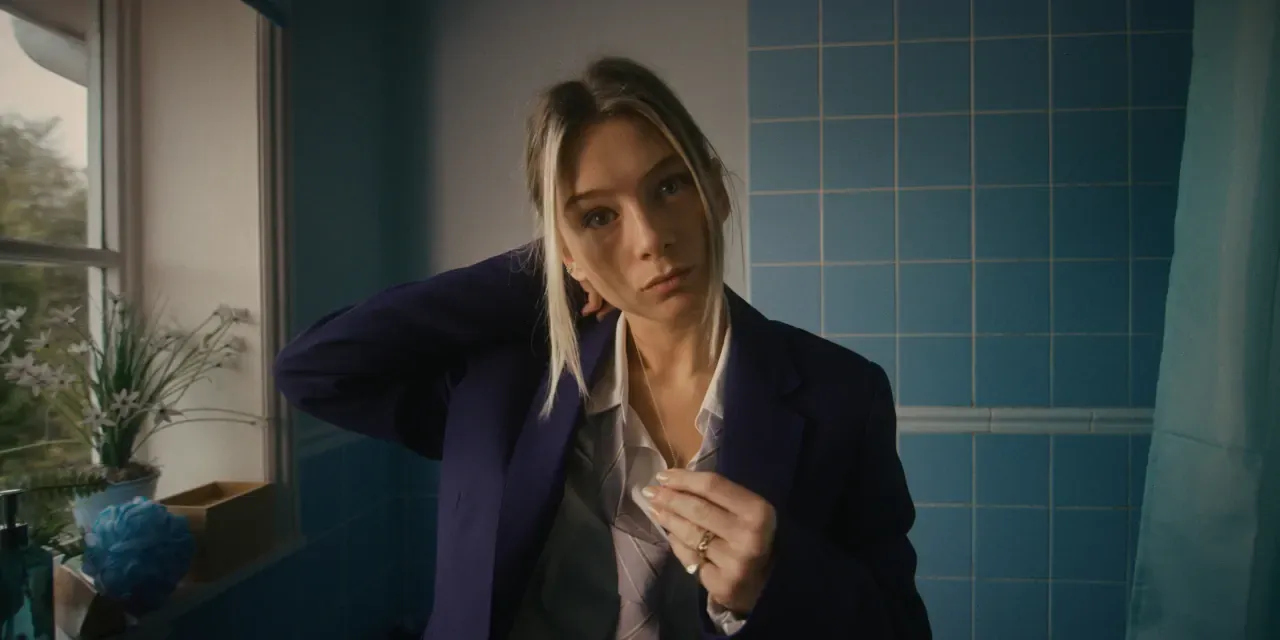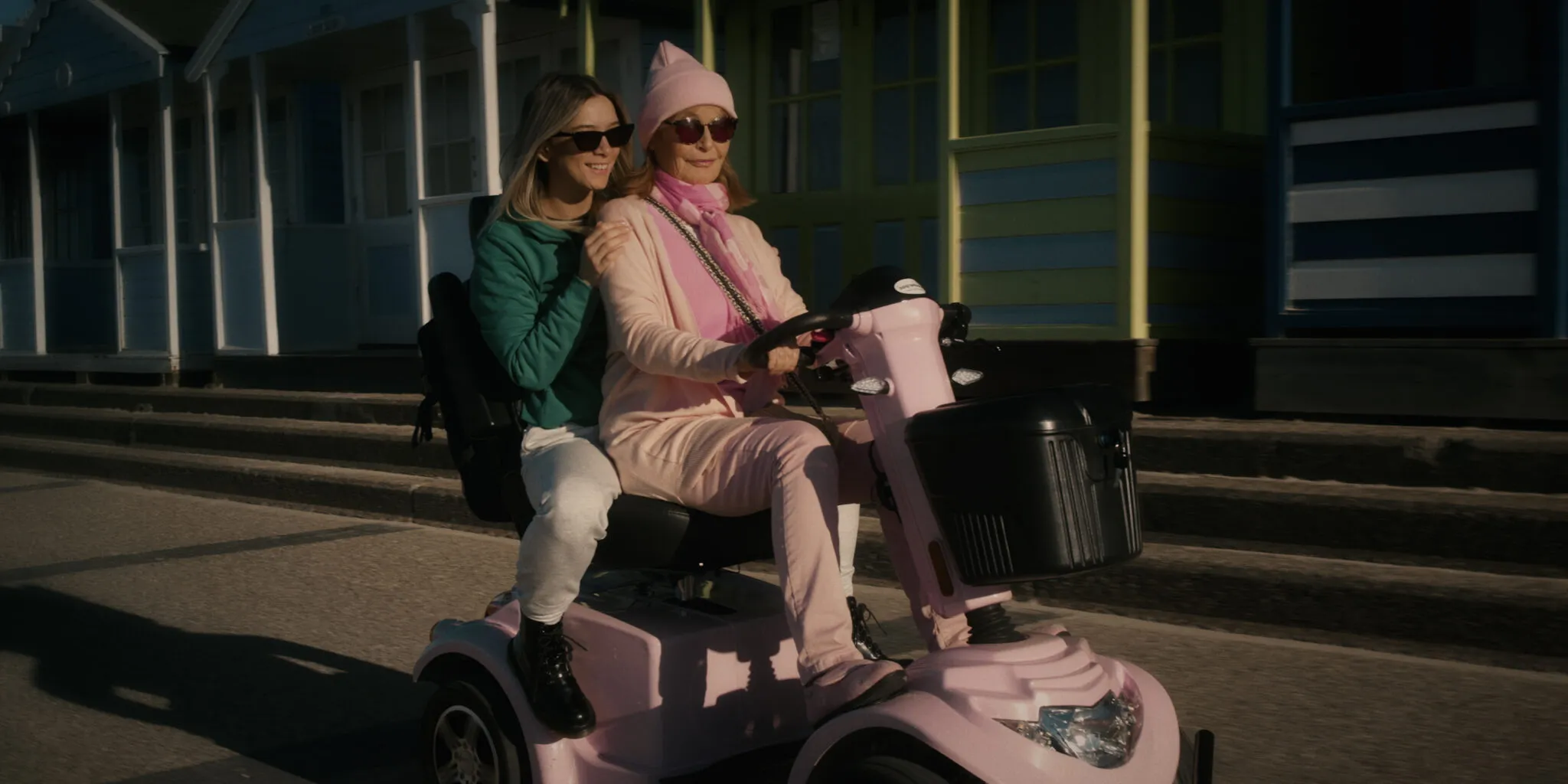Grey Matter arrives at a moment when intimate family stories are shifting toward raw emotional honesty. Chloe (Eloise Smyth) drifts through the end of her teenage years—ditching swim practice, floundering at work and locked in the usual high‑school restlessness—until her grandmother’s Alzheimer’s diagnosis forces an abrupt realignment of her priorities.
That turning point propels Chloe into the role of caregiver for Peg (Stephanie Beacham), upending the summer she expected and reshaping every family ritual. Arabella Burfitt‑Dons and screenwriter Elizabeth Hrib guide us through that shift with a mix of playful warmth and quiet ache, threading light moments—Peg’s scooter escapades, impromptu therapy quips—through scenes of startling vulnerability.
Tonally, Grey Matter balances its coming‑of‑age arc with the weight of responsibility. It never wallows, yet never glosses over the sting of each forgotten name or misplaced photograph. Eloise Smyth grounds Chloe’s resistance in precise, lived‑in gestures, while Beacham captures Peg’s flickers of clarity with equal parts fragility and defiance.
Visually, cinematographer [Name] frames cramped living rooms to mirror Chloe’s initial frustration, then widens into sunlit parks as the pair embarks on their bucket‑list adventures. Editing stitches these moments into a rhythm that echoes memory itself—sometimes elliptical, sometimes abrupt—underscoring a narrative structure that quietly reimagines how we measure time together.
Mapping Memory: Narrative Flow in Grey Matter
From its first moments, Grey Matter grounds us in Chloe’s everyday drift—early‑morning swims, half‑hearted shifts at the café, terse conversations with friends and family. These opening scenes unfold in tidy, linear order, with medium‑close framing that feels familiar to anyone who’s watched the routines of adolescence play out on screen. That sense of routine becomes a narrative anchor, guiding viewers through Chloe’s emotional detachment before anything extraordinary happens.
The turning point arrives when Peg’s misplaced keys and missed appointments trigger a formal Alzheimer’s diagnosis. The film signals this shift by intercutting Chloe’s therapy session—complete with wry counsels and clipped humor—with shots of Peg wandering through an empty house. Those juxtapositions, brief but pointed, mark the moment when the narrative moves from portrait of teen ennui into a caregiving drama.
As family debates swirl—parents trading worried glances, Chloe bristling at responsibility—the director tightens the focus on our protagonist. Early caregiving sequences appear in a series of montages: morning pill routines, mislaid grocery lists, endless phone calls. Editing here mirrors Richard Linklater’s accumulation of small moments in films like Boyhood, yet the film also injects a dash of experimental indie spirit by occasionally slipping into brief flashbacks of Peg’s past vitality.
The film’s emotional apex arrives during the “bucket‑list” outing. A carnival ride dissolves into a sudden cut: Peg’s laughter gives way to a fearful glance, and the soundtrack drops into near silence. That abrupt shift unveils the fragility beneath the joy and marks the true narrative climax.
Following that, tension eases into quieter terrain. Family scenes settle into longer takes, giving Chloe space to absorb her new reality. Dialogue slows, expressions linger, and we see how caregiving reshapes her outlook. That structural echo—beginning in confined frames and ending in open compositions—signals a subtle resolution.
Pacing throughout balances light relief with weighty drama. Sprightly interludes—Peg zipping down a suburban street on her scooter—sit alongside more meditative beats. The film’s rhythm never races, yet it avoids stalling, carrying us through each phase of Chloe’s journey with both warmth and precision.
Characters in Flux: Performances Rooted in Reality
Eloise Smyth’s portrayal of Chloe captures the reluctant caregiver with nuanced precision. In early scenes, Chloe’s slumped shoulders and quick, dismissive replies convey a teenager unwilling to trade social freedom for responsibility. During therapy sessions, Smyth’s slight tremor of the hand and the catch in her voice give her resistance a palpable texture.
As Chloe learns to administer medication or coax Peg out of confusion, those small gestures—an apologetic touch to the grandmother’s arm, a hesitant smile—signal her growing empathy. I’m reminded of the way Saoirse Ronan infused Lady Bird with verbal economy, letting body language speak volumes; Smyth achieves a similar intimacy here.
Stephanie Beacham brings Peg’s defiance into sharp relief. Her first appearance aboard the mobility scooter is a moment of comic relief that morphs into something more profound when Beacham’s eyes betray sudden fear. Those memory lapses—misplaced photographs, repeated questions—are handled with neither sentimentality nor spectacle. Instead, the camera lingers just long enough on Beacham’s face to let you register recognition and loss in the same look. That balance mirrors the caregiving vérité of films like Amour, yet retains its own fresh sensitivity.
Elizabeth Berrington and Paul Brennen embody parental strain with unvarnished honesty. Berrington’s Eileen snaps awake at night, her voice rough with exhaustion; Brennen’s father figure hovers in doorways, guilt and helplessness etched on his brow. Their conflicts with Chloe—from sharp admonitions to moments of genuine concern—ground the film’s emotional stakes.
Secondary characters—Chloe’s school friend, a fellow support‑group member, the shy love interest—act as mirrors and foils. A classmate’s frustration with Chloe highlights her isolation, while the tentative romance underscores her new maturity.
What cements these portrayals is the ensemble chemistry. A dinner‑table scene unfolds in one continuous take, each actor’s timing and eye line perfectly aligned, creating a sense of lived‑in family tension. Those unbroken frames recall elements of indie gems like The Station Agent, where space and silence reveal more than dialogue alone. Here, Grey Matter’s cast turns a personal story into a communal one, making each performance resonate with authenticity.
Symbols of Care: Memory, Identity, and Time
Grey Matter positions caregiving as a mirror in which Chloe confronts adult realities far removed from her teenage comfort zone. The film’s repeated framing of Chloe guiding her grandmother’s hand—whether through a morning routine or a hesitant dance on a pier—signals that care can reverse roles. That switch of agency speaks to a broader shift in how young people shoulder family burdens today, reflecting cultural conversations around intergenerational support.
Alzheimer’s steals memories one by one, and the filmmakers use visual echoes—a misplaced teacup reappearing on a shelf, a photo album left open—to trace Peg’s shifting sense of self. Those images carry weight: a faded snapshot of Peg in her youth suddenly feels like a lifeline for both characters. As family members sift through mementos, the film asks who we become when our history slips away.
Chloe’s arc moves from self‑absorption to genuine presence. Early scenes show her scrolling through social feeds; later, she listens in silence as her grandmother recounts an old family joke. That contrast marks a rite‑of‑passage, one that challenges coming‑of‑age tropes by replacing prom drama with the quiet courage of everyday devotion.
The bucket‑list motif—ranging from mundane errands to impromptu scooter races—serves as a vow to seize fleeting moments. Each item scratched off brings a mix of laughter and tension, underscoring that joy and loss can coexist.
Humor threads through the drama as a lifeline. Peg’s scooter antics recall the charming absurdity of films like The Intouchables, while Chloe’s wry comments in therapy lighten the weight of looming heartbreak.
Time itself becomes a character. Clocks tick in half‑lit hallways, empty rooms stretch in long takes, and editing slows as memories fade. Those choices remind us that life’s meaning resides in both action and stillness, in what we choose to remember and what we let slip away.
Crafting Atmosphere: Visual and Auditory Textures
The film’s visual palette is a study in contrast. Interior scenes often feel close‑quartered—tight framing in the kitchen or living room heightens the weight of Chloe’s new responsibilities. In contrast, outdoor sequences unfold in wider compositions: sunlit parks or quiet suburban streets appear as fleeting oases of calm. That shift in scale recalls the way Manchester by the Sea uses open skies to suggest emotional release.
Lighting design reinforces emotional highs and lows. Family gatherings glow in warm amber, evoking comfort even amid tension. By contrast, moments of memory loss—Peg gazing at an empty chair or Chloe discovering forgotten pills—are underscored by cooler, desaturated hues. Those chilly tones register like a subtle visual sigh.
Camera movement serves the story’s emotional beats. Handheld close‑ups trace Chloe’s tentative steps into caregiving, lending each moment a sense of urgency. When the characters share quieter interludes—reviewing a photo album or swapping soft smiles—the camera eases into steady, contemplative takes. That ebb and flow of motion echoes the shifting intimacy between the two leads.
Editing stitches these visual moods into a coherent rhythm. Caregiver routines appear in brisk montages—morning alarms, medication sorting, grocery runs—mirroring the loop of daily life. Then, as Chloe’s empathy deepens, sequences are allowed to breathe: longer cuts let emotions land fully. It reminded me of the restrained editing in Lady Bird, where pace itself becomes part of the character’s inner world.
The soundtrack weaves between original score and diegetic music. A gentle piano theme surfaces during tender exchanges, while snippets of 90s indie rock play on car radios, anchoring the story in a lived‑in reality.
Sound design brings every creak and whisper to the forefront. The soft rattle of a wheelchair wheel, the distant ticking of clocks—these everyday noises take on emotional weight, underscoring how every sound can carry a memory.
Heartbeats in Silence: Emotional Resonance
Moments of warmth surface when Peg’s laughter rings out over a spontaneous scooter ride or when Chloe and her grandmother pore over an old photo album, eyes lighting up at shared memories. These instances invite genuine smiles, reminding viewers how small gestures can carry profound meaning.
Then the film cuts sharply to memory lapses: Peg pausing mid‑sentence, searching for a lost photograph; Chloe’s helpless glance as a panic episode unfolds on a pier. Family arguments unfold in tight, shadowed rooms—voices raised, tears falling—each note striking with raw honesty. The farewell scenes hold particular weight, framed in lingering shots that give space for grief to settle.
Grey Matter earns its emotional pull through unvarnished truth. Alzheimer’s isn’t softened into neat symbolism but presented in all its erratic rhythms. Watching Chloe wrestle with guilt, frustration and love feels tangible, as if we’re seated beside her at every medication reminder and trembling hug.
Playful moments—a therapy session quip or Peg’s cheeky scooter stunt—diffuse tension without undercutting the stakes. Humor becomes a lifeline, allowing us relief between heavier beats, while preserving the film’s sincerity.
Whether young or old, anyone who’s cared for another will find points of entry in Chloe’s story. Her resistance, her breakthroughs, even her quiet sighs will resonate with viewers who recognize how care reshapes us all.
Looking Back and Moving Forward
Eloise Smyth and Stephanie Beacham anchor the film with performances that feel lived‑in. Smyth’s gradual shift from detached teen to devoted carer unfolds in subtle gestures—a softened tone, a tentative embrace—while Beacham balances defiance and fragility in scenes of memory loss. Arabella Burfitt‑Dons’ direction respects the material’s weight, weaving playful interludes (Peg’s scooter races) into moments of unguarded emotion. Visually, the contrast between claustrophobic interiors and sunlit exteriors underscores the film’s exploration of time and freedom.
The romantic subplot surfaces briefly yet never fully resonates, as if sidelined by the caregiving drama. At times the pacing drifts: some montages zip by too quickly, while quieter scenes linger beyond their emotional payoff. A tighter narrative focus might have sharpened the film’s central themes.
Viewers who appreciate character‑driven family dramas, coming‑of‑age stories steeped in real‑world stakes, and films that treat illness with honesty will find plenty to engage them. Caregiver support groups and festival programmers seeking intimate portrayals of intergenerational bonds will recognize its value.
Available now on streaming platforms, Grey Matter rewards patient viewing and discussion. Its mixture of warmth and realism makes it a fitting choice for community screenings and post‑viewing conversations about memory, loss, and unexpected growth. Approach this film as an intimate portrait of love under strain, where small acts of care resonate far beyond the screen.
The Review
Grey Matter
Grey Matter delivers heartfelt performances and sensitive direction, balancing humor and heartbreak through deft visual storytelling and genuine chemistry. While its pacing falters in spots and a side romance feels underwritten, its truthful depiction of caregiving and memory leaves a lasting impression.
PROS
- Eloise Smyth and Stephanie Beacham deliver deeply empathetic performances
- Gentle humor lightens heavy moments without undercutting emotion
- Visual contrasts between confined interiors and open exteriors reinforce themes
- Sound design—every creak and piano note—underscores memory’s fragility
- Authentic portrayal of family dynamics under caregiving strain
CONS
- Romantic subplot feels sketched rather than fully fleshed out
- Occasional lulls in pacing interrupt the film’s emotional flow
- Some supporting threads receive less development than the central bond
- Flashback glimpses into Peg’s past aren’t always woven smoothly





















































